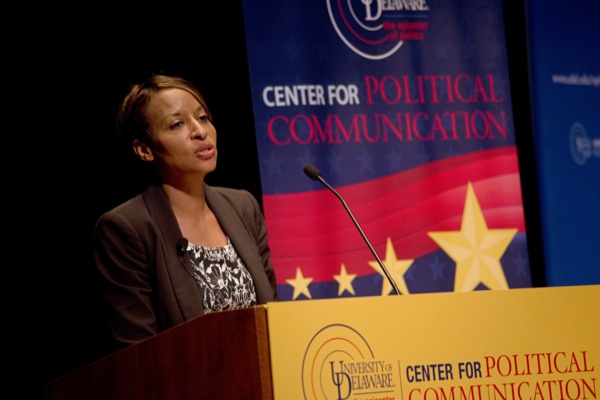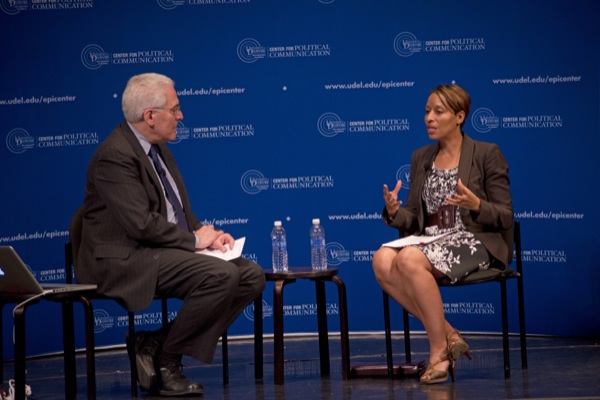Global Agenda
US faces China challenge in Africa, speaker tells Global Agenda audience
4:07 p.m., April 18, 2013--American influence in Africa is being challenged by a rising and deep-pocketed China, Zambian entrepreneur Iris Mwanza told a University of Delaware Global Agenda audience Wednesday night in Mitchell Hall.
Mwanza, speaking as part of the spring series focused on “America’s Role in the World,” has a unique perspective. She has completed graduate studies in the United States, held positions at the World Bank and a nongovernmental organization dealing with HIV/AIDS, and founded Mobile Payment Solutions Ltd., a Zambian technology company that hopes to harness the mobile phone as a vehicle for financial services.
People Stories
'Resilience Engineering'
Reviresco June run
In 2012, the U.S. Agency for International Development (USAID) awarded Mwanza’s company an innovation award for a micro insurance product sold on the mobile phone.
If the United States is to take on China in Africa, Mwanza said, it cannot win spending dollar for dollar. Rather, it must use its resources more wisely, making sure that taxpayers’ money is not tied up in domestic and foreign agencies but makes its way to the people on the ground who are in need.
Waves of aid
Mwanza said the United States has influenced Africa in four eras – what she called “waves” -- of aid, the first being the post-colonial and Cold War era. Through that time, the continent was another battleground between the U.S. and Soviet Union, who provided aid divorced from internal politics, creating and sustaining “client regimes” and often supporting despots.
With the end of the Cold War, American policy shifted to aid designed to support human rights and economic reforms, and a further change in a third wave saw policy move to aid with preconditions designed to promote democracy.
The last decade has seen a fourth wave in the rise of initiatives, such as the President’s Emergency Plan for AIDS Relief (PEPFAR) put in place by President George W. Bush in 2003 with a $15 billion commitment to fight the disease.
While initiatives have good intentions in promoting health care, good governance, economic development, education and the environment, they lack overall direction, Mwanza said, questioning their effectiveness when “measured in terms of the bang for the buck.”
The availability of $15 billion to 15 African nations should have led to the transformation of the whole health care system on the ground, she said, but did not.
The fourth wave’s failures have been exacerbated by a commodities boon on the continent that has seen national budgets less and less reliant on aid. The major investor in the boon has been China, which Mwanza said is not interested in social issues but strictly in paying for resources, “trade, not aid” being its mantra.
‘Fifth wave’
To compete with China in Africa, Mwanza said, the United States must consider a “fifth wave,” with policy designed to establish stable democracies by growing the middle class.
America should “focus on doing a few things, but on doing them well,” she said, and with a long-term commitment to economic development.
She suggested the U.S. lift its cap on the import of textiles from Africa, “which could really make a difference,” and that it “get serious” in support for democratic institutions including free press, the judiciary and opposition groups.
In some respects, the American response to the rise of China to this point has been a “war of words, not actions,” she said, adding that “China bashing” does not play well.
Still, Mwanza said the U.S. can retain its significant influence in Africa through more efficient and thoughtful use of its resources. “America doesn’t need to do more, it needs to do better,” she said.
Private sector
As CEO of Mobile Payment Solutions, Mwanza said the private sector, in its ability to build a middle class, may be a key to the future of Africa. With a solid middle class comes democratic ideals, she said.
Her company is based on a successful Kenyan model and provides Zambians an option for accessing financial services, as most have cell phones but only about 15 percent have bank accounts, she said.
The company helps turn the cell phone into a mobile, electronic bank and in addition to individual clients is working with nongovernmental organizations to make payments to workers in the field.
About Global Agenda
Global Agenda is sponsored by the Center for Political Communication and presented by the Institute for Global Studies, the Department of Communication and the Department of Political Science and International Relations.
The theme of this year’s Global Agenda is “America’s Role in the World.”
The series is moderated by Ralph Begleiter, director of UD’s Center for Political Communication.
The series is free and open to the public.
The series will conclude April 24 with a presentation on “Shaping the Internet’s Global Future” by Rebecca MacKinnon, author of Consent of the Networked: The Worldwide Struggle for Internet Freedom and a senior fellow at the New America Foundation in Washington, D.C. A book signing will follow the presentation.
Article by Neil Thomas
Photos by Duane Perry












